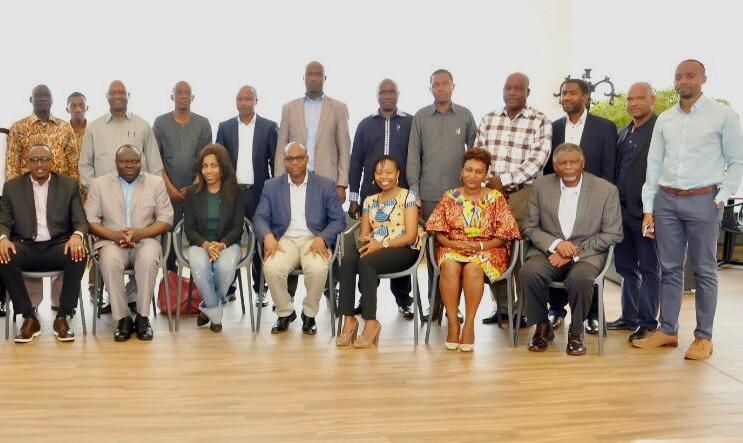Regional garment industries step up buy local campaign
 Representatives from several garment companies and policy-makers across the region met early this week and proposed implementation of the declaration of Fridays as ‘Afrika Mashariki Fashion Day.’
Representatives from several garment companies and policy-makers across the region met early this week and proposed implementation of the declaration of Fridays as ‘Afrika Mashariki Fashion Day.’
Representatives from several garment companies and policy-makers across in the East African Community (EAC) met early this week and proposed a ‘Buy East Africa, Wear East Africa’ campaign including implementation of the declaration of Fridays as ‘Afrika Mashariki Fashion Day’.
At the conclusion of the First Forum of Owners of Cotton, Textiles and Apparels (CTA) Manufacturing Industries it was also suggested that there is consistent purchasing of all institutional uniforms, beddings, draperies by state institutions from textiles and fabric industries in the region.
In June, President Uhuru Kenyatta encouraged Kenyans to wear locally made clothing as a way to lift the garments industry long beset by imports of relatively second hand clothes.
Kenyatta said, “We must create demand for our own products by actively consuming those products ourselves. Towards this objective, let us encourage each other to proudly wear Made in Kenya garments.” On Wednesday, the Kenyan government directed civil servants dress-down on Fridays wearing locally-made attire.
Another resolution of the forum was to organize the Annual “Afrika Mashariki Fashion Week” exhibition to precede the EAC Heads of States Summit Meetings normally held on November 30, every year.
Under the theme ‘Promoting Local Production and Consumption of Cotton, Textile and Apparels (CTA) Made in the EAC Region’, the two-day forum was intended to ensure that the owners of CTA industries meet, discuss pertinent issues within the sector and make useful and practical recommendations to the EAC Policy Organs especially the Heads of State Summit for purposes of promoting the sector.
Rwanda’s Permanent Secretary of Trade and Industry, Michel Minega Sebera, said CTA has the potential to create employment, improve economic well-being and widen the tax base in the region.
Sebera asked EAC Partner States to fast-track the phasing out of the second hand clothes in order to reap the benefits of the sector. He informed the meeting that in 2016, Rwanda started implementing the Summit directives and embarked on the phase out of the second hand clothes (mivumba).
As a result of this policy, he said Rwanda had attracted new investments in the sector and led to more than 15 new companies investing in apparels. Other EAC member states have flirted with both a blanket and phased bans of mivumba clothing, but the apologists continue to sway government thinking, especially the fact that these imports support millions of jobs across the region. While Kenya, Tanzania and Uganda have dithered, Rwanda has gone ahead to halt all mivumba. Annual imports of mivumba are worth an estimated $15o billion to $160 billion.
Sebera said Rwanda had developed an enabling infrastructure in the exports processing zones and efforts by the regional institutions to promote the sector comes at a good time amidst the emergence of larger market particularly the Africa Continental Free Trade Area.
Christophe Bazivamo, the EAC Deputy Secretary General in charge of the Productive and Social Sectors, said the Secretariat had begun implementing directives on promoting local manufactured textiles and was in the process of mobilizing the East Africans to wear clothes made in East Africa.
Bazivamo invoked patriotism and national pride whenever it came to consuming products made in the EAC and called for a change of attitude, mindsets and perception with regard to locally manufactured products.
He called for synergy among the Partner States in developing the CTA sector, adding that lone ranger tactics would not yield much.

 African Heads of state head to South Korea next week for Summit talks
African Heads of state head to South Korea next week for Summit talks
 Trading leads as main source of income for Ugandans
Trading leads as main source of income for Ugandans
 New leadership for bankers’ umbrella as total assets top $12 billion
New leadership for bankers’ umbrella as total assets top $12 billion
 Brussels Airlines to announce Nairobi service
Brussels Airlines to announce Nairobi service
 SITA promises enhanced travel experience after Materna acquisition
SITA promises enhanced travel experience after Materna acquisition
 Saudia’s 105 aircraft order stretches A320neo lead over rival Max
Saudia’s 105 aircraft order stretches A320neo lead over rival Max
